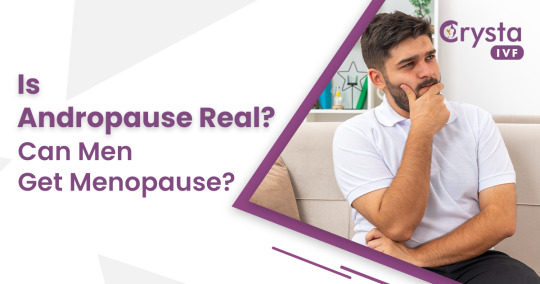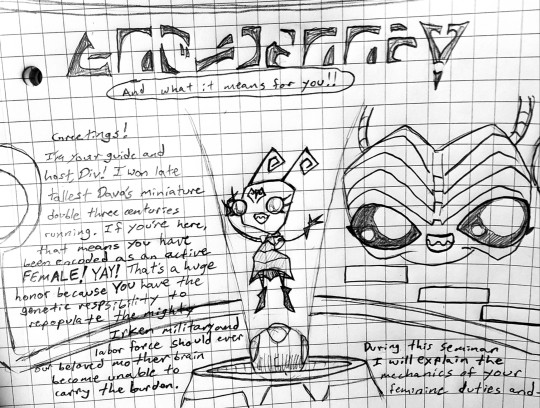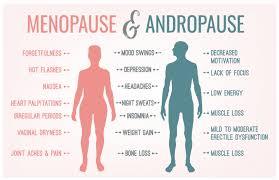#Andropause Causes
Explore tagged Tumblr posts
Text
Is Andropause Real? Can Men Get Menopause?

In this condition, there is a gradual decrease in testosterone levels in men, affecting them physically and emotionally. While it’s a common problem in men as they age, its significance can immensely affect the health and well-being of men.
Unveil the truth: Is andropause real? Explore the facts on men experiencing menopause symptoms. Discover insights into male hormonal changes.
#Andropause#Andropause Symptoms#Andropause Causes#Male Menopause#Menopause in men#Andropause Testing#is Andropause real#Andropause Diagnostic
0 notes
Text
"Am I intersex?"
If you have ever asked this question, we hope this post finds you (and that you check out our intersex guide, which we updated today.)
Do you have high levels of androgens, or high levels of estrogen? That is intersex. (Yes, even if its from PCOS. Yes, even if you are 'female' with hyperestrogenism or hypoandrogenism, or 'male' with hyperandrogenism or hypoestrogenism.)
Do you have low levels of androgens, or low levels of estrogen (not caused by menopause/andropause)? Or does your body not process the hormones it is producing? That is intersex
Do you have chromosomes that differ from XX or XY? Or do your chromosomes "mismatch" your body? That is intersex
Is your urethra in an atypical spot, being lower or higher than expected (hypospadias or epispadias)? Were you born with an extra urethra? Or is your urethra merged with your vaginal canal, anus, or both? That is intersex
Were you born with a curved penis (congenital chordee)? Were you born with a scrotum that is atypical (penoscrotal transposition, shawl scrotum, etc)? Do you have an extra penis? That is intersex
Were you born with genitals that have absent, small, or closed parts? A narrow, incomplete, or absent urethra? A narrow or shallow vagina? An absent vagina? A hymen or tissue that partially or fully blocks the vaginal entry? A vulva that has absent labia on one or both sides? A small or absent clitoris? A micropenis? A congenital hidden/buried penis? A penis born with no foreskin? Undescended testicles (that didn't naturally descend within the first 3-6 months after birth)? Little or no genitalia whatsoever? That is intersex
Do you have ambiguous genitals (that ARENT from surgery or HRT?) Do you have a bifid scrotum? Do you have fused labia? Do you have a large clitoris (yes, even one that developed naturally during puberty)? Do you have a penis and a clitoris at the same time? Or penis with labia? Or a penis where a clitoris "should" be? Or a vaginal canal underneath a penis? That is intersex
Are your reproductive organs atypical? Is your uterus, prostate, gonads, fallopian tubes, vas deferens, or seminal vesicles small or absent? Do you have streak gonads? Do you have extra reproductive traits (extra gonads, extra vas deferens, uterus didelphys, etc)? Do you have both ovarian tissue and testicular tissue present in your body at the same time? Do you have a prostate and a uterus at the same time? That is intersex
Whether you have only ONE of these traits, or MULTIPLE of these traits - the conclusion is the same. Every single trait listed here...is intersex.
And if you used to have these things, but your body was changed (either by yourself, or as a form of medical abuse, such as genital mutilation, reproductive mutilation, hormone abuse, etc)...you are still intersex.
Doctors will very likely not diagnose you as intersex. They may actively deny your intersex status when you call yourself that. But you are intersex if you fall under any of these traits. They will instead likely tell you that you have a "hormone disorder", "urogenital/genital deformity/disorder", "reproductive disorder/deformity", "disorder of sexual development/DSD", or other intersexist work-arounds that they were taught in medical school, or personally came up with.
#lgbtqia#lgbt#lgbtq#lgbt pride#queer#intersex#educate yourself#intersex spectrum#body diversity#intersex community#intersex rights#queer community#hormones#hrt#hormone health#hormonal variations#hormonally intersex#intersex people#intersex awareness#chromosomes#chromosomally intersex#genital variations#hormone variations#chromosome variations#hormone replacement therapy#hormone therapy#hormone balance#hormone blockers#ambiguous genitals#ambiguous genitalia
37 notes
·
View notes
Note
Hi! i wanted to ask you (and not google) if gynecomastia is considered an intersex condition on its own?
Nope! It's a trait, not a variation. Or condition as you said, but I prefer to say variation as it's non-pathologizing. Condition if I must, NEVER disorder. But pedantic rambling aside!
By itself it's completely typical, and can crop up with a number of causes that aren't intersex in nature, such as tumors, andropause, certain illnesses and drugs, and recovering from malnutrition. Hell it can occur during wolffian puberty but should resolve on its own within a few years; if it doesn't, start questioning!
Intersex traits are just that, traits that are intersex in nature, and have you fall under the umbrella. Though just because you have the traits doesn't inherently mean you have a variation, as a lot of traits can come about from benign causes as described above. Something something intersex variations (often) cause intersex traits, but not all traits come from variations, would be my way of summarizing it.
30 notes
·
View notes
Note
How does Dr Fizz not empty with wings? I think they make lids for cans so that may be a kinda cool solution. It could be customized, too, but if you've got an idea already don't let me step in your cornflakes.
thanks for asking!! i have an entire theory :D
So, apparently, [winged] Dr Fizz could fly normally until the events of Box's Exit Interview. There he blew his top after Lifering annoyed him by repetitive questions given to Box by the viewers, which caused him to lose a fair amount of his soda, which functions as his hydroskeleton and keeps him alive. Ever since, his top looks like this (image below this text) and he's more careful of his own movement, because, one wrong move and he's no longer alive.

However, you gave me a good idea. I think that he wears a can lid while he's sleeping or doing any other activity that requires laying down.
There's no need for him to wear a lid while he's flying. His wings are 2-3 times bigger than his body and his body is not aerodynamically shaped. That prevents him from flying horizontally. If he flew horizontally, like most birds, he would probably fall down and, nowadays, spill and die. Instead, he flies vertically, like most pigeons when they're flying on short distances and massive hummingbirds. Let's use this wood pigeon as an example. I see a lot of pigeons in my city, and they mostly fly like this on short distances.


Also, i have a headcanon that Dr Fizz is around 38-40 years old. All living beings tend to lose energy as they get older. Birds and winged Dr Fizz are not exceptions. Apparently, according to most object shows, sentient objects age, function and have a civilization just like humans. Dr Fizz is, according to my headcanon, middle aged and close to andropause, which usually starts in late 40s. And also, there's no use for him to spread his wings a lot, because they can hit other sentient objects and cause a lot of issues.
p.s. i'm a (winged??) dr fizz fictionkin, i think most of these might be kinmems :P
context
@beepject @thegummysharkbagsys obligatory dr fizz enjoyer tag ^^
#inanimate insanity#osc#inanimateinsanity#inanimate insanity invitational#ii#object show community#object shows#object show#oscblr#osc community#object show au#inanimate insanity au#ii au#biology#aerodynamics#um actually 🤓#🤓#🤓🤓🤓#i got an ask!#theory#fan theory#fandom theory#object show theory
21 notes
·
View notes
Note
Once irkens become fertile, do they stay fertile until they die, or do they go through a menopause/andropause phase in which they become infertile once they become elderly?
Irkens don't go through a menopause/ andropause phase the way humans do. [At least not in my personal head canon, so I really don't expect anyone to apply this to their own head canons.]
Almost all irkens [pre control brain take over] experienced a silking cycle upon complete physical maturity [around 100-years-old, in most hives. The silking cycle's purpose is to condition the drone's body for the task of matung/conception, not to indicate the body of the drone is ready for the task. Nor does experiencing a silking cycle clearly indicate a drone's gender. The exposure and exchange of pheromones plays the biggest role and each fertility festival is a different experience... ]
Irken women tend to produce more silk with stronger fibers and experience more regular cycles, but cycles vary from hive to hive. The ability to collect fibers from Irken silk and spin it into thread is a lucky byproduct of nature and Irken curiosity/ ingenuity. Just as important for survival and development as the discovery of fire.
The data collected on safe Irken mating practices are dangerously limited to nonexistent for the Irken civilian; reserved for medical drones and classified to all others, to clarify.
Fertile Irken women usually can't successfully conceive and carry a swarm until they are at least 200-400 years old. The younger the drone, the higher the risk of maternal death. Very seldomly can an Irken give birth more than 3 times and survive the labor. Most die soon after their second birth (Mem is a legendary exception). Proper medical care can better the chances of survival, but nature makes the rules.
So in the earliest era to the third, the three main causes of death for Irken women were 1; war and/or work related casualties, 2; Smeetbirth and 3; exhaustion/ starvation (which can arguably be lumped into war or work related casualties.)
It is not a guarantee that a drone who silks is a fertile female or even a biological female. Only exposing and exchanging pheromones will determine if a drone will sire or conceive during the fertility festival. (Irken gender differentiation is purely representational and cosmetic; not at all governed by the same rigid/ ridiculous standards human gender differentiation is.)
Passing larger amounts of blood/ proteins/ chunks of spooch tissue can be a sign that the drone may have difficulty surviving birth. Yeet, at roughly 16-years-old, started her silking cycle; is an oddity an medically concerning. Had she been born in an earlier era, Yeet most likely would not have survived giving birth to her first swarm, if her life had not been taken by some kind of work/ war related casualty.

For any other specific questions about the Irken silking cycle, I will direct you to Div. She, or her virtual downloaded personality interface hosts the mandatory lecture on Irken Womanhood. (I have notes on the subject concerning the silking cycles of modern drones and pre control brain take over drones. I just need to find the sketchbook. Sorry, I',m so unorganized. And sorry this answer was so long-winded. Tried to answer as many questions on the subject as possible because I'm centuries behind on asks. ^^;)
Wanted to reblog this because I edited this a little and I wanted to add this
10 notes
·
View notes
Text
The Significance of Hormone Restoration for Health and Vitality
Hormones are the body's chemical messengers, responsible for regulating a wide range of functions including metabolism, mood, sleep, libido, and energy levels. As we age, or due to certain medical conditions, hormone levels can become imbalanced. This hormonal decline is often gradual but can have a profound effect on overall wellbeing. Hormone restoration therapy aims to bring these levels back into balance, helping individuals regain vitality, physical health, and emotional stability.
Understanding Hormonal Imbalance
Hormonal imbalances can affect both men and women, though the symptoms may vary. Women often experience issues during perimenopause and menopause, with common signs including hot flushes, mood swings, fatigue, and weight gain. Men, on the other hand, may experience andropause, a gradual decline in testosterone, leading to low energy, reduced muscle mass, and diminished libido.
But hormone imbalances are not limited to midlife. Younger adults can also be affected due to stress, poor diet, sleep disorders, or underlying medical conditions. Common symptoms of hormonal disruption include:
Persistent fatigue
Sleep disturbances
Low mood or anxiety
Decreased concentration
Weight changes
Hair thinning or loss
Reduced sexual function
Left untreated, hormonal imbalances can increase the risk of more serious health issues, such as osteoporosis, cardiovascular disease, and metabolic syndrome.
Why Hormone Restoration Matters
Hormone restoration aims to correct these imbalances by replenishing deficient hormones to optimal levels. This is typically done through bioidentical hormone replacement therapy (BHRT), which uses hormones chemically identical to those produced by the body. The goal is not just to alleviate symptoms but to support long-term health and improve quality of life.
Some key benefits of hormone restoration include:
Improved energy levels: Balanced hormones help regulate metabolism and support healthy adrenal function, reducing fatigue.
Better sleep quality: Restoring hormones like melatonin, progesterone, or cortisol can promote restful sleep.
Mood stability: Hormones such as oestrogen, testosterone, and thyroid hormones influence neurotransmitters that affect mood, focus, and emotional balance.
Increased libido and sexual health: Balanced hormones support healthy sexual desire, performance, and reproductive function.
Support for weight management: Hormonal harmony can reduce fat accumulation, especially around the abdomen, and help maintain lean muscle mass.
Bone and heart health: Oestrogen and testosterone play crucial roles in maintaining bone density and cardiovascular health.
A Personalised Approach
One of the most important aspects of hormone restoration is customisation. No two individuals have the same hormonal needs, so effective treatment requires a personalised approach. This typically begins with a comprehensive consultation and blood tests to evaluate hormone levels. A tailored plan is then created, often combining hormone therapy with lifestyle changes such as improved diet, exercise, stress management, and sleep hygiene.
Hormone restoration isn’t a quick fix—it’s a long-term strategy focused on optimal ageing and preventive health. When managed by experienced practitioners, it can be a transformative experience for those struggling with the symptoms of imbalance.
Conclusion
Hormone restoration offers a scientifically backed, holistic solution for many of the issues people commonly associate with ageing or chronic stress. Rather than simply masking symptoms, it works to address the root cause of hormonal disruptions and restore balance naturally. By doing so, it empowers individuals to feel energised, focused, and in control of their health once again.
If you're exploring safe and personalised solutions for hormone health, a reputable hormone clinic in the UK can provide expert assessment and tailored treatment plans to help you restore balance and live well at every stage of life.
0 notes
Text
Complete Hormone Testing in Los Alamitos, California
Testing your hormone levels is important for accurate diagnosis of your symptoms relating to menopause, andropause or thyroid imbalance. However, we know it’s important to treat the person and not just the result. You may have been told all your test results are normal, yet you still struggle with your weight, fatigue, and brain fog. You need the complete picture. We’ll search for hidden causes as to why you feel off. https://www.loomishealthyliving.com/hormone-balance-testing/
0 notes
Text
Bioidentical Hormone Replacement Therapy (BHRT) in Cape Coral and Fort Myers, FL
What is Bioidentical Hormone Replacement Therapy (BHRT)?
Bioidentical Hormone Replacement Therapy (BHRT) is a treatment designed to restore hormone levels in men and women experiencing imbalances due to aging, genetics, or health conditions. BHRT uses plant-derived hormones that are chemically identical to those naturally produced by the body. These hormones integrate seamlessly into the bloodstream, helping to alleviate symptoms and restore balance.
Am I a candidate for BHRT?
BHRT can be used to treat both men and women when their hormone levels plummet and become depleted or unbalanced. BHRT is beneficial for those experiencing hormone imbalances due to:
Perimenopause, menopause, or post-menopause
Andropause (male hormone decline)
Chronic fatigue, brain fog, or mood swings
Weight gain, muscle loss, or decreased libido
Poor sleep, anxiety, or depression
Although commonly used for age-related hormone changes, BHRT can also help individuals in their 20s and 30s deal with imbalances caused by genetics, stress, or underlying health conditions. If you're struggling with symptoms, a hormone assessment can determine if BHRT is right for you.
How Long Does It Take to See Results?
Most patients begin to feel symptom relief within 2-4 weeks, with optimal balance achieved in 8-14 weeks. Progress is monitored to ensure the best results.
What Are the Benefits of BHRT?
Increased Energy & Vitality – Feel more energized throughout the day.
Better Mood & Mental Clarity – Reduce anxiety, depression, and brain fog.
Improved Sleep – Experience deeper, more restful sleep.
Enhanced Libido & Sexual Health – Address hormonal imbalances affecting intimacy.
Weight Management Support – Boost metabolism and maintain a healthy body composition.
Stronger Bones & Heart Health – Lower the risk of osteoporosis and cardiovascular disease.
How is BHRT Different from Traditional Hormone Therapy?
Traditional Hormone Replacement Therapy often uses synthetic hormones, which may not match the body’s natural hormones and can lead to more side effects. On the other hand, BHRT uses bioidentical hormones that are structurally identical to those your body produces. This allows for a more natural integration with fewer risks.
Can BHRT Help with Anti-Aging?
Yes! Hormonal imbalances can accelerate aging, causing fatigue, weight gain, cognitive decline, and reduced skin elasticity. BHRT helps by:
Increasing energy and mental clarity
Improving skin elasticity and hydration
Enhancing muscle tone and strength
Pairing BHRT with a healthy lifestyle, balanced nutrition, and proper skin care can maximize its anti-aging benefits.
At Skin Secrets, we’re dedicated to helping you restore vitality, balance, and overall well-being with Bioidentical Hormone Replacement Therapy (BHRT). If you're experiencing symptoms of hormone imbalance, now is the time to take control of your health.
Message Skin Secrets today or call us at 239-800-SKIN(7546) to schedule your complimentary consultation.
0 notes
Text
Hormone Replacement Therapy at Palm Beach Health Works: A Path to Wellness
Hormone Replacement Therapy (HRT) is a widely sought-after treatment that can transform lives, helping people balance their hormones, alleviate discomfort, and improve overall well-being. At Palm Beach Health Works, HRT is not just a treatment; it’s a personalized solution designed to address the unique needs of each patient.
What is Hormone Replacement Therapy?
Hormone Replacement Therapy (HRT) involves replacing or supplementing hormones that may be at low levels or out of balance in the body. These hormones include estrogen, progesterone, testosterone, thyroid hormones, and others. HRT can help restore balance, improving various physical and emotional symptoms associated with hormonal imbalances, especially during major life changes like menopause or andropause.
Benefits of Hormone Replacement Therapy
Hormones play an essential role in regulating many of the body’s functions, including metabolism, mood, energy, and sexual health. When hormone levels fluctuate or drop, it can lead to symptoms such as fatigue, weight gain, mood swings, and low libido. Through tailored HRT, Palm Beach Health Works helps patients regain their vitality, improving their quality of life.
Some key benefits of HRT include:
Enhanced Energy Levels: Many people report feeling more energized after starting HRT, as the treatment helps correct hormone imbalances that contribute to fatigue.
Improved Mood and Mental Clarity: Hormonal changes, particularly during menopause, can cause mood swings, anxiety, and even depression. HRT can help alleviate these symptoms and improve emotional stability.
Better Sleep Quality: Hormonal fluctuations can lead to insomnia or restless sleep. By restoring hormone balance, HRT can contribute to more restful nights and better overall health.
Increased Libido: Low hormone levels, particularly estrogen and testosterone, can cause a decline in sexual desire. HRT can help restore libido and improve sexual health.
Enhanced Skin Health and Appearance: Hormonal imbalances can affect skin health, leading to dryness, wrinkles, or other aging signs. HRT can help rejuvenate the skin, making it look more vibrant and youthful.
Improved Bone Density and Muscle Mass: HRT can help improve bone strength and prevent osteoporosis by restoring estrogen levels in women. It also supports muscle mass and overall physical strength.
Why Choose Palm Beach Health Works for HRT?
At Palm Beach Health Works, HRT is more than just a one-size-fits-all approach. The experienced team at this clinic takes a comprehensive approach to hormone replacement, ensuring that each patient receives individualized care based on their unique needs.
Here’s why you should consider Palm Beach Health Works for HRT:
Personalized Care: The team at Palm Beach Health Works works closely with patients to understand their symptoms, health goals, and personal needs. Every treatment plan is customized to ensure optimal results.
Expert Team: With a dedicated team of professionals, Palm Beach Health Works offers expertise in hormone balancing and the management of related health conditions. Their focus is on providing safe, effective, and evidence-based treatments.
Cutting-Edge Technology: Palm Beach Health Works uses advanced diagnostic tools and the latest medical techniques to assess hormone levels and create tailored treatment plans. This helps to ensure that each patient gets the most effective therapy possible.
Holistic Approach: While HRT is an important part of treatment, Palm Beach Health Works also emphasizes a holistic approach to health. This includes addressing nutrition, lifestyle habits, and other factors that contribute to overall well-being.
Comfort and Convenience: Located in the heart of Palm Beach, the clinic provides a relaxing and comfortable environment for patients to receive their treatments. The team is committed to making the experience as easy and seamless as possible.
Is Hormone Replacement Therapy Right for You?

Hormone Replacement Therapy is particularly popular among women going through menopause or men experiencing andropause. However, individuals at any age may benefit from hormone balancing if they are dealing with related issues such as thyroid dysfunction or adrenal imbalances.
Get Started with Palm Beach Health Works Today
Hormone imbalances can affect your daily life, but with the right treatment, you can regain balance and vitality. If you’re considering HRT or simply want to learn more, Palm Beach Health Works is here to guide you every step of the way. The team will work with you to develop a treatment plan that is tailored to your specific needs, ensuring the best possible results.
Take control of your health today. Visit Palm Beach Health Works to schedule a consultation and begin your journey toward better health and wellness.
Contact Information:
Palm Beach Health Works Phone: 561–475–3508 Address: 10471 Southern Blvd, Royal Palm Beach, Florida 33411 Website: www.palmbeachhealthworks.com
Hormone Replacement Therapy Palm Beach could be the key to unlocking a healthier, more balanced you. Let the experts at Palm Beach Health Works help you achieve optimal health with personalized care and cutting-edge treatments.
0 notes
Text
Achieve Hormonal Balance with Bioidentical Hormone Replacement Therapy at Balboa Medical Center

If you’re experiencing fatigue, weight gain, or emotional fluctuations, you may be dealing with hormonal imbalances. Bioidentical Hormone Replacement Therapy (BHRT) offers a natural solution to restore balance and help you regain energy, vitality, and well-being. At Balboa Medical Center in Encino, CA, our skilled team, led by Dr. Amir Raeesy, offers personalized BHRT treatments tailored to your unique needs.
What is Bioidentical Hormone Replacement Therapy (BHRT)?
Bioidentical Hormone Replacement Therapy is a medical treatment designed to restore hormones that are no longer produced in adequate amounts by the body. These hormones are derived from natural sources and are chemically identical to the hormones your body produces naturally, making them a safer and more effective solution than traditional hormone therapy.
Common Conditions Treated with BHRT
Hormonal imbalances due to aging (menopause, andropause)
Fatigue, weight gain, and mood swings
Reduced libido and sexual dysfunction
Cognitive decline and memory issues
Why Should You Consider Bioidentical Hormone Replacement Therapy?
Restore Energy and Vitality: BHRT combats fatigue, helping you regain energy and enthusiasm for daily activities.
Enhanced Mood and Mental Clarity: By balancing hormones, BHRT can reduce mood swings, irritability, and mental fog, improving overall emotional and cognitive stability.
Supports Healthy Aging: BHRT can slow down the signs of aging by addressing hormone deficiencies that affect physical appearance and function.
Improves Sexual Health: BHRT helps balance hormones that influence sexual health, increasing libido and improving sexual function.
Helps Manage Weight: BHRT regulates hormones that play a role in metabolism, making it easier to lose weight or maintain a healthy weight.
How Does Bioidentical Hormone Replacement Therapy Work?
The process of BHRT involves several steps that begin with a thorough evaluation of your hormone levels and medical history. Here’s how the treatment works:
Step 1: Comprehensive Hormone Testing We perform advanced testing to assess your hormone levels and identify imbalances.
Step 2: Personalized Treatment Plan Based on the results of your tests, we create a tailored BHRT plan. This may include hormone creams, gels, patches, injections, or pellets.
Step 3: Ongoing Monitoring and Adjustment As your therapy progresses, we continually monitor your symptoms and adjust the dosage to ensure that you get the most effective results.
What to Expect from BHRT Treatment at Balboa Medical Center
Initial Consultation: During your first appointment, we’ll evaluate your symptoms, medical history, and hormone levels to determine the best treatment plan for you.
Customized Treatment: We design a personalized plan based on your unique hormone profile.
Follow-Up Care: We regularly check in to track your progress and make adjustments as necessary to ensure optimal results.
Results: Many patients begin feeling improvements in energy, mood, and overall wellness within a few weeks of starting treatment.
Why Choose Balboa Medical Center for BHRT?
Experienced Professionals: Led by Dr. Amir Raeesy, our team has extensive experience in delivering personalized Bioidentical Hormone Replacement Therapy that addresses the unique needs of each patient.
Comprehensive Care: At Balboa Medical Center, we don’t just treat the symptoms of hormone imbalance; we identify and address the root causes to promote long-term health.
Tailored Solutions: We understand that each individual is unique, which is why we offer customized BHRT programs that are designed specifically for you.
Advanced Technology: Our clinic uses state-of-the-art diagnostic tools and high-quality bioidentical hormones to provide you with the safest, most effective care possible.
Ready to Regain Your Vitality?
If you're ready to feel your best and restore balance to your life, Bioidentical Hormone Replacement Therapy at Balboa Medical Center is here to help. Schedule your consultation today by calling us at (818) 701-0017 or visiting our website to learn more about our BHRT services.
#BioidenticalHormoneTherapy#HormonalBalance#HealthyAging#EnergyRestoration#BHRT#WellnessJourney#SexualHealth#FatigueRelief#WeightManagement#EncinoCA
0 notes
Text
Andropause
Andropause, also known as male menopause, is a gradual decline in testosterone levels in men as they age. This decline can lead to various physical and psychological symptoms.
Causes:
Age-related decline in testosterone production by the testes
Reduced sensitivity to testosterone
Other underlying health conditions, such as obesity, diabetes, and heart disease
Symptoms:
Decreased libido and erectile dysfunction
Fatigue
Reduced muscle mass and strength
Mood changes (depression, irritability)
Decreased bone density
Hot flashes (less common than in women)
Increased body fat
Cognitive decline
Diagnosis:
Andropause is diagnosed based on a blood test that measures testosterone levels. Other factors, such as symptoms and medical history, may also be considered.
Treatment:
Treatment options for andropause may include:
Testosterone replacement therapy (TRT)
Lifestyle changes, such as exercise, weight loss, and stress management
Medications to improve erectile function or mood
Note:
Not all men experience andropause or its symptoms. The decline in testosterone levels is typically gradual and may not cause significant problems for many men. It's important to consult with a healthcare professional for proper diagnosis and treatment recommendations.

0 notes
Text
Skip to main content
Skip to secondary menu
Skip to primary sidebar
Skip to footer

Where Wellness & Culture Connect
Where Wellness & Culture Connect
Subscribe
Home / Wellness / Mens Health
Is “Male Menopause” A Real Thing?

Ten to forty percent of men will experience a testosterone deficit. Other names for this condition include andropause, late-onset hypogonadism, and androgen insufficiency, but the most well-known one is male menopause. Here is all the information you need to know about it.
Why Male Menopause Is Not Talked About
Several causes drive the lack of information about male menopause.
Trending Articles
Advertisement

Powered By 
First, males are less likely than women to visit their doctors for routine checks.
Men with health issues are much less likely than women to have recently consulted a doctor, according to research published in The National Library of Medicine (NLM). Men don't visit the doctor as frequently as women do, making the chances for these phase-of-life chats less common.
You May Also Like
Our team is looking for children diagnosed with moderate to severe lupus.
Another difficulty is that males do not feel as comfortable talking to a doctor about private subjects like sexual dysfunction or mental health difficulties.
According to a Myotonic Dystrophy Foundation study, approximately 37% of men say they feel uncomfortable discussing sexual matters with their doctor. And according to the NLM, men are less likely than women to seek mental health care.
Male menopause symptoms frequently revolve around these two problems: sexual dysfunction and mental health decrease. Menopause is not frequently detected in men, which is not unexpected.
RELATED: Top Health Concerns Impacting Black Men & Screening Guidelines
What Does Male Menopause Really Mean?
The easiest way to think of male menopause is as reverse puberty. Boys' bodies produce more testosterone as they get closer to puberty. The following stage is a rise in sexual function, an increase in body hair, a decrease in voice, and an increase in muscle mass.
You May Also Like
8 Facts Every Brother Should Know About Prostate Cancer
Men may experience a loss of muscular mass, a loss of body hair, and even a decrease in libido drive due to
low testosterone levels during male menopause. There is, however, more to it than that.
According to MayoClinic, males aged 30 and older have an annual decline in testosterone levels of 1%. The decline may occur more quickly when a man enters male menopause (about age 50 and up). So, males may suddenly go through more severe versions of the modest physical and mental changes they have been experiencing for years.
What Distinctions Exist Between Male and Female Menopause?
Male and female menopause share certain commonalities but also significant distinctions.
Men who have gone through menopause can have kids. The complete shutdown of the reproductive organs is brought on by female menopause. A woman is no longer able to become pregnant after menopause. Most men can theoretically reproduce far into their later years.
Male menopause develops gradually. Similar to male menopause, female menopause entails a reduction in certain hormone levels. Women, on the other hand, experience the hormonal transition quickly. For men, the transition may occur gradually over several years.
Not all males experience it. The main distinction is that while menopause affects women, it does not affect all men.
RELATED: 6 Things Every Healthy Man Knows
Menopause In Males: Symptoms
Male vitality, physical stamina, muscle mass, and the flight-or-fight reaction are all influenced by testosterone levels. Therefore, as they drop, the following signs could manifest:
Depression
Fatigue
A low sense of self
Sleep problems
Gaining weight
Male breast development
Poor libido
A challenge getting an erection
Reduced testicle size
Loss of body hair
A hot flash
Low bone mass
Menopause Treatment for Males
Unless male menopause significantly impairs a patient's quality of life, most doctors won't recommend anything more than simple lifestyle modifications. These could consist of the following:
Increasing sleep
Increasing activity, especially weightlifting, to increase muscle
Performing relaxation techniques like yoga and meditation
Consuming a balanced diet
For males suffering from severe depression or seeing changes in their mental health due to the condition, a doctor may occasionally prescribe antidepressants or suggest treatment.
There is hormone therapy available, including synthetic testosterone. However, it is rarely advised due to its possible negative effects.
The Latest In Mens Health
Black Men Aren’t Superman: Health Screenings For Black Men at Any Age
17 Embarrassing Men’s Health Questions…Answered!
A Guide for Black Men: Health Screenings to Start in Your 40s
Prostate Cancer 101: What Black Men Need To Know Now
More Black Men are Embracing Therapy in 2024, Here’s Why…
Real Talk – Is Sperm a Factor in Miscarriages?
Primary Sidebar
Subscribe to our newsletter
Never miss a beat. From articles about the latest trends in Health & Wellness to everyday topics that affect you!
Sign up!
Poll
What do you believe is the biggest challenge to early diagnosis of Multiple Myeloma?
Lack of awareness about symptoms
Limited access to specialists
Fear or stigma surrounding cancer
I’m not sure
223 votes
VoteView Results
Trending Articles
6 Benefits of Stretching Every Day

Hip-Hop Mogul and Producer for Ashanti, Ja Rule Passes Away at 54

5 Complications Black Folks with PA Commonly Face (And What to Do)

How Old Beliefs About Clinical Trials Are Holding Us Back

6 Things Black People Should Stop Doing to Our Hair


Footer
Where Wellness & Culture Connect
BDO is the world’s largest and most comprehensive online health resource specifically targeted to African Americans. BDO understands that the uniqueness of Black culture - our heritage and our traditions - plays a role in our health. BDO gives you access to innovative new approaches to the health information you need in everyday language so you can break through the disparities, gain control and live your life to its fullest.
Connect With Us
Join Us!
Resource Centers
Top Blacks in Healthcare
Clinical Trials
Wellness on the Yard
Cancer
Immunocompromised Care
About Us
Privacy Policy
Advertise With Us
BlackDoctor.org Advertising and Sponsorship Policy
Daily Vitamina
TBH
Copyright © 2025, BlackDoctor, Inc. All rights reserved.

0 notes
Text
How Does Hormone Replacement Therapy Work?
Hormone Replacement Therapy (HRT) has become an increasingly popular treatment option for individuals experiencing hormone imbalances due to various life stages, such as menopause or andropause, or health conditions that disrupt natural hormone levels. HRT aims to restore hormone levels in the body, helping to alleviate symptoms like mood swings, brain fog, hot flashes, and fatigue. This article will explore how HRT works, its benefits, and how cutting-edge strategies such as DNA-based health recommendations and Naturopath acupuncture can complement hormone therapies to optimize your overall health and well-being.

What is Hormone Replacement Therapy (HRT)?
Hormone Replacement Therapy is a treatment designed to replenish hormones in the body that are at low levels or out of balance. This therapy is most commonly used for individuals experiencing menopause, perimenopause, or andropause, as these stages can result in a decrease in key hormones such as estrogen, progesterone, and testosterone.
There are several types of HRT, including:
Estrogen-only therapy: Typically used for women who have undergone a hysterectomy.
Combined HRT: This type involves both estrogen and progesterone and is used for women who still have their uterus.
Testosterone therapy: Often prescribed for men and women with low testosterone levels.
The goal of HRT is to relieve symptoms caused by low hormone levels and restore balance to help individuals feel more like themselves.
Benefits of Bioidentical Hormones
Bioidentical hormones are a type of HRT that is chemically identical to the hormones naturally produced by the human body. These hormones are derived from plant-based compounds and are often considered a more natural alternative to synthetic hormones.
Benefits of bioidentical hormones include:
Fewer side effects: Many people report fewer side effects with bioidentical hormones than with synthetic hormones.
Improved symptom management: Bioidentical hormones are particularly effective in managing symptoms of menopause, such as hot flashes, night sweats, and vaginal dryness, as well as improving mood and energy levels.
Personalized treatment: Bioidentical hormone therapy can be tailored to the individual’s specific needs, taking into account their unique hormone levels and health history.
Individuals seeking bioidentical hormone treatment often turn to specialists like naturopathic doctors who offer a personalized, integrative approach to hormonal health.
How DNA Insights Can Enhance Hormonal Health
Cutting-edge DNA-based health optimization strategies offer a more tailored approach to hormone replacement therapy. By analyzing your genetic makeup, healthcare providers can gain insights into how your body processes hormones, how susceptible you are to certain hormonal imbalances, and the most effective treatment for you.
DNA-based health insights can be used to:
Optimize cognitive health: Genetic testing can uncover how your DNA impacts brain function and mental clarity. This is particularly useful for addressing brain fog solutions and cognitive decline linked to hormone imbalances.
Improve mood regulation: DNA insights for mood swings can help identify genetic predispositions that may affect mood regulation, allowing for more precise interventions.
Enhance brain performance: DNA-based brain performance strategies focus on how your genes influence your brain function, helping you optimize your cognitive health through tailored diet and lifestyle changes.
Personalized hormone therapy: By analyzing genetic data, healthcare providers can recommend specific hormones and dosages that are most likely to be effective for your unique genetic profile, maximizing the benefits of hormone replacement therapy.
This approach to health is not just about replacing hormones but about optimizing your entire system based on your genetic makeup.
Complementary Treatments for Hormone Health
While HRT is a primary treatment for restoring hormone balance, many individuals seek complementary therapies to enhance the benefits of their treatment. Acupuncture is one such therapy that has gained popularity for its potential to alleviate symptoms of hormone imbalance and improve overall wellness.
Acupuncture Near Me: If you’re looking for acupuncture near you, consider seeking practitioners who specialize in hormone health and wellness. Acupuncture has been shown to support the body’s natural healing processes, which can aid in regulating hormones and improving overall energy levels.
Acupuncture in Oregon City: For those in Oregon City, acupuncture treatments can be a great option to complement hormone replacement therapy. Acupuncture helps by stimulating the body’s meridian points, which can help improve circulation, reduce stress, and support hormone production.
Studies have shown that acupuncture can be particularly helpful for managing symptoms of menopause, such as hot flashes, mood swings, and sleep disturbances, by regulating the body’s hormonal systems and boosting overall well-being.
DNA-Based Health Recommendations for Hormonal and Cognitive Wellness
The future of health optimization lies in personalized care based on DNA-based health recommendations. These recommendations can help you achieve better hormonal balance, mental clarity, and overall cognitive health by considering your genetic predispositions.
For example:
DNA-based cognitive health solutions can help you understand how your body processes neurotransmitters and hormones related to mood and mental clarity, guiding more effective treatments.
DNA analysis for brain fog solutions can reveal whether certain genetic variations might contribute to cognitive issues like memory problems or fatigue, allowing for targeted interventions such as personalized supplements or diet changes.
By integrating DNA-based strategies with traditional treatments like hormone replacement therapy, individuals can take a more proactive and personalized approach to their health, resulting in improved physical and mental wellness.
Conclusion
Hormone replacement therapy can be an effective solution for individuals experiencing symptoms of hormonal imbalances, offering relief from issues like mood swings, brain fog, and fatigue. By combining Bioidentical hormone specialist in oregon city with DNA-based health optimization and complementary therapies such as acupuncture, individuals can take a holistic approach to restoring hormone balance and improving overall well-being.
Whether you're seeking acupuncture in Oregon City, bioidentical hormone therapy, or DNA insights for mood swings, the key is personalization. With advanced tools like DNA analysis and a comprehensive approach to treatment, you can achieve better health outcomes and feel more in control of your body’s hormonal and cognitive health.
For More Info:-
Hormone Therapy Oregon City
Naturopathic Doctor Oregon City
0 notes
Text
Testosterone Decline in Men: The Hidden Impact of Ageing
As men age, it's common to notice changes in energy, mood, and physical performance. While many chalk these shifts up to stress or “just getting older,” one major factor often goes overlooked: testosterone decline. Testosterone, the primary male sex hormone, plays a vital role in muscle mass, strength, libido, mental clarity, and overall wellbeing. After the age of 30, levels begin to decrease gradually—typically by about 1–2% per year—which can add up over time and significantly impact quality of life.
Why Testosterone Matters
Testosterone isn’t just about sex drive or gym performance. It supports a wide range of functions, including red blood cell production, fat metabolism, bone density, and cognitive function. When levels drop below optimal, men can experience fatigue, irritability, reduced muscle tone, belly fat accumulation, brain fog, and decreased motivation. Low testosterone has also been linked to a higher risk of conditions such as type 2 diabetes, cardiovascular disease, and depression.
Signs of Age-Related Testosterone Decline
Because symptoms often develop gradually, many men don’t realise they’re related to hormones. Common signs include:
Low energy and poor recovery from physical activity
Reduced interest in sex or changes in sexual performance
Mood changes, including anxiety, low mood, or irritability
Increased fat around the abdomen
Difficulty building or maintaining muscle
Sleep disturbances or poor concentration
These symptoms, particularly when they occur together, may indicate testosterone deficiency—sometimes referred to as andropause or “male menopause.”
What Causes Testosterone Decline?
Age is a natural contributor, but lifestyle factors can accelerate the drop. Chronic stress, poor sleep, lack of exercise, excess alcohol, and poor diet can all negatively affect hormone production. Inflammation, insulin resistance, and obesity can also disrupt the balance of testosterone and its regulatory hormones.
Testing and Diagnosis
If you’re experiencing symptoms of low testosterone, a simple blood test can help assess your hormone levels. It’s important to measure not just total testosterone, but also free testosterone, SHBG (sex hormone-binding globulin), and other key markers like DHEA, estradiol, and cortisol to get a full picture of hormonal health.
Restoring Balance
Treatment for low testosterone should always be personalised. At clinics like Levitas Hormones, a full assessment—including symptoms, lifestyle, and lab results—is used to develop a tailored plan. This may involve lifestyle changes, targeted supplements, and in some cases, Testosterone Replacement Therapy (TRT) using bioidentical hormones.
TRT, when carefully monitored, can help restore energy, mood, focus, muscle tone, and libido. Importantly, any hormone therapy should be supervised by a qualified medical professional to ensure safety and effectiveness.
Conclusion
Testosterone decline is a natural part of ageing, but it doesn’t mean you have to settle for low energy, poor mood, or diminished performance. Understanding your hormones and taking proactive steps can help you age with strength, clarity, and vitality.
If you’re noticing changes and suspect low testosterone, consider speaking with a specialist at a trusted London hormone clinic like Levitas Hormones. A simple test could be the first step toward feeling like yourself again.
0 notes
Text
Boost Your Mood This Fall with Hormone Replacement Therapy

This is attributable to the fact that as the beautiful covers the crisp air of the autumn season sets in, mood changes or the impacts of short days are apparent. Change of seasons and fluctuating hormones causes one to dull, cranky, lethargic or in simple words sickly. Hormone Replacement Therapy (HRT) provides a known method of dealing with these issues and regain your emotional well-being. HRT functions through supplementing needed estrogen, progesterone and testosterone to boost moods and energy besides boosting general body health. From menopausal transition and andropause to age changes, HRT gives you the answer to balance your hormones and regain health. At Bodywise, we specialize in creating personalized HRT plans that suit your unique needs. Our dedicated team is here to support you every step of the way, ensuring that you feel empowered and cared for throughout your wellness journey. This fall, don’t let hormonal shifts or seasonal changes dictate how you feel.
Read more: HRT improve mood this fall
#HormoneTherapy#FallWellness#BoostYourMood#SeasonalHealth#BodywiseCare#HRTBenefits#MoodBalance#HealthyLiving
0 notes
Text
Hormone Replacement Therapy: A Pathway to Renewed Vitality and Wellness
As hormones gradually change within our bodies through aging, symptoms apparent in both physical and mental aspects may arise: things that sometimes impact the quality of life for many individuals. This includes hormones like estrogen, progesterone, testosterone, and thyroid hormones, which do an enormous job in regulating one's mood, energy, and metabolism to sexual health, among many others. Generally, such symptoms include discomfort affecting daily life that occurs when levels of these hormones drop or go out of balance. Luckily, hormone replacement therapy (HRT) is one avenue toward restoring that balance and an overall healthier life.
In this blog, we will explore what hormone replacement therapy is, how it works, and how it can help improve the lives of individuals experiencing hormonal imbalances. Additionally, we will look at how services like those provided by Nuvital Infusion & Wellness can help patients find the right HRT treatment for their needs.

What is Hormone Replacement Therapy (HRT)?
Hormone replacement therapy (HRT) is a medical treatment used to restore hormones to their optimal levels in individuals whose hormone production has decreased due to aging or other factors. The treatment involves replacing the hormones that the body is no longer producing in sufficient amounts, helping to alleviate the symptoms caused by hormone imbalances.
HRT is most commonly associated with women undergoing menopause, but it can also be beneficial for men experiencing andropause (a gradual decline in testosterone levels as they age) or individuals with thyroid imbalances, adrenal insufficiency, or other hormone-related issues.
Types of Hormone Replacement Therapy
There are different forms of hormone replacement therapy, depending on the patient’s needs, the hormones being replaced, and the preferred delivery method. Some of the most common types of HRT include:
Estrogen Replacement Therapy (ERT): Primarily used to treat symptoms of menopause, ERT involves supplementing the body with estrogen, the female hormone that declines during this life stage. Estrogen can be administered in various forms, including pills, patches, gels, and creams.
Progesterone and Progestin Therapy: Often used alongside estrogen, progesterone or its synthetic version, progestin, helps protect the lining of the uterus and prevents the overgrowth of the uterine lining that can occur when estrogen is used alone.
Testosterone Replacement Therapy (TRT): Testosterone is often linked to male vitality, and as men age, their testosterone levels tend to decline. This decline can lead to fatigue, reduced libido, and muscle loss. TRT helps restore testosterone to optimal levels and is available in the form of injections, patches, gels, or implants.
Thyroid Hormone Replacement: Thyroid hormones regulate metabolism, energy levels, and body temperature. If the thyroid gland is underactive (hypothyroidism), it can result in fatigue, weight gain, and mood disturbances. HRT in the form of synthetic thyroid hormones (such as levothyroxine) can help restore proper thyroid function.
Bioidentical Hormone Replacement Therapy (BHRT): Bioidentical hormones are derived from natural plant sources and are chemically identical to those the body produces. BHRT aims to offer a more natural approach to hormone therapy by using hormones that are more similar to the body's own.
Combined HRT: This involves using a combination of estrogen and progesterone to address symptoms associated with menopause and prevent long-term complications such as osteoporosis.
Benefits of Hormone Replacement Therapy
The primary goal of hormone replacement therapy is to restore hormonal balance, alleviating the symptoms that can disrupt daily life. The specific benefits of HRT will vary depending on the individual, the hormones being replaced, and the method of delivery, but common benefits include:
Improved Mood and Emotional Well-being: Hormonal imbalances can lead to symptoms of anxiety, depression, and irritability. Restoring hormonal balance can help improve emotional stability, leading to a more positive outlook on life.
Increased Energy Levels: Fatigue and low energy are common complaints among individuals with hormone imbalances. HRT can help boost energy levels, making it easier to go about daily activities and improve overall productivity.
Enhanced Libido and Sexual Health: A decline in estrogen or testosterone can reduce sexual desire and function. HRT can restore sexual health and improve libido, helping individuals feel more confident and satisfied in their relationships.
Better Sleep Quality: Hormonal imbalances, especially during menopause, can lead to disruptions in sleep patterns. HRT can help improve sleep quality, leading to better rest and increased overall vitality.
Healthier Skin and Hair: Hormones play a significant role in maintaining healthy skin and hair. Low estrogen levels, for example, can lead to dry skin and hair thinning. HRT can help rejuvenate the skin and promote healthier hair growth.
Prevention of Osteoporosis: Estrogen helps maintain bone density. As estrogen levels decrease during menopause, women become more susceptible to osteoporosis. HRT can help protect against bone loss and reduce the risk of fractures.
Improved Cognitive Function: Hormonal fluctuations can affect memory, focus, and cognitive function. Restoring hormones to their optimal levels through HRT can help improve mental clarity and reduce the risk of cognitive decline.
Is Hormone Replacement Therapy Right for You?
Hormone replacement therapy is not suitable for everyone, and it’s essential to consider the potential risks and benefits before starting treatment. Common side effects of HRT can include headaches, nausea, breast tenderness, or an increased risk of blood clots, stroke, or certain cancers. However, these risks can often be managed with the help of a skilled medical professional.
Before beginning HRT, it’s crucial to have a thorough consultation with a healthcare provider who can evaluate your symptoms, perform blood tests, and discuss your medical history to determine if HRT is right for you. This is where Nuvital Infusion & Wellness can provide invaluable support.
Nuvital Infusion & Wellness: Your Partner in Hormone Replacement Therapy
At Nuvital Infusion & Wellness, patients are offered personalized care to help them achieve optimal health and wellness through customized treatment plans. The medical team at Nuvital specializes in hormone replacement therapy, offering both traditional and bioidentical options to meet the unique needs of each individual. They take a holistic approach to health, ensuring that hormone therapy is combined with other treatments, such as nutritional counseling and lifestyle recommendations, to enhance overall well-being.
The experts at Nuvital Infusion & Wellness work closely with each patient to monitor progress and adjust treatment as needed to ensure the best results. They also emphasize the importance of regular check-ups to maintain hormone levels and prevent any long-term side effects.
If you're considering hormone replacement therapy to improve your vitality and wellness, Nuvital Infusion & Wellness is here to help guide you every step of the way. Their team provides a comprehensive approach to hormone therapy, taking into account your specific symptoms, lifestyle, and health goals.
Conclusion
Hormone replacement therapy can be a life-changing solution for those struggling with the effects of hormonal imbalances. Whether you're dealing with symptoms of menopause, andropause, thyroid issues, or other hormone-related challenges, HRT offers a pathway to restore health and vitality. However, it’s crucial to work with a trusted healthcare provider, such as the team at Nuvital Infusion & Wellness, to ensure you receive the most appropriate care.
With personalized, expert care and a range of treatment options, Nuvital Infusion & Wellness is committed to helping you restore your hormonal balance, improve your quality of life, and achieve lasting wellness. Reach out to them today to explore the benefits of hormone replacement therapy and discover how they can help you feel like your best self again.
0 notes